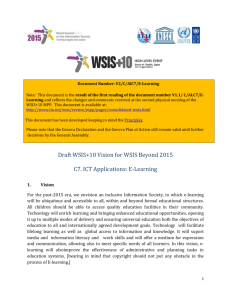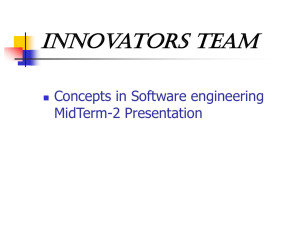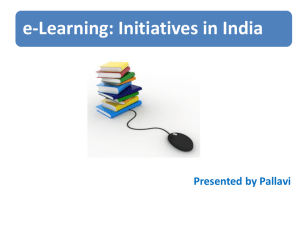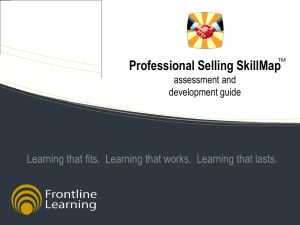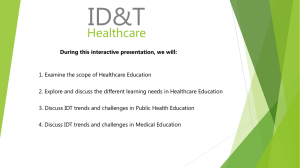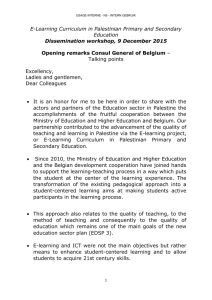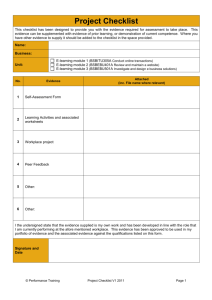Document Number: V2.1/C/AlC7/E-Learning Note: This document
advertisement
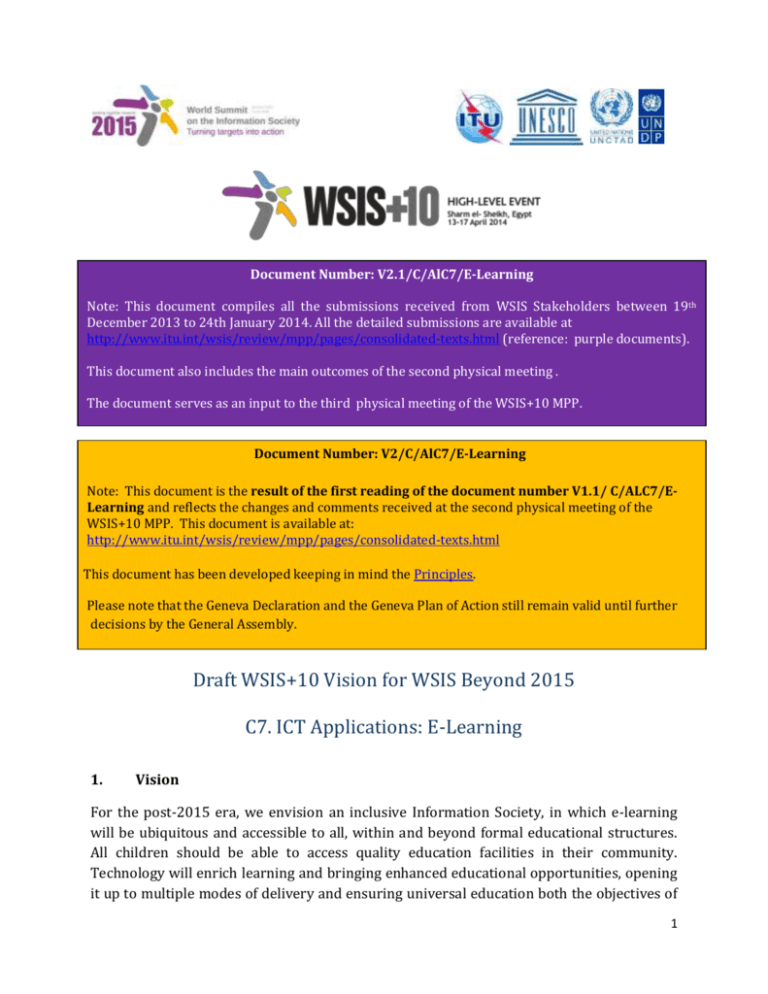
Document Number: V2.1/C/AlC7/E-Learning Note: This document compiles all the submissions received from WSIS Stakeholders between 19th December 2013 to 24th January 2014. All the detailed submissions are available at http://www.itu.int/wsis/review/mpp/pages/consolidated-texts.html (reference: purple documents). This document also includes the main outcomes of the second physical meeting . The document serves as an input to the third physical meeting of the WSIS+10 MPP. Document Number: V2/C/AlC7/E-Learning Note: This document is the result of the first reading of the document number V1.1/ C/ALC7/ELearning and reflects the changes and comments received at the second physical meeting of the WSIS+10 MPP. This document is available at: http://www.itu.int/wsis/review/mpp/pages/consolidated-texts.html This document has been developed keeping in mind the Principles. Please note that the Geneva Declaration and the Geneva Plan of Action still remain valid until further decisions by the General Assembly. Draft WSIS+10 Vision for WSIS Beyond 2015 C7. ICT Applications: E-Learning 1. Vision For the post-2015 era, we envision an inclusive Information Society, in which e-learning will be ubiquitous and accessible to all, within and beyond formal educational structures. All children should be able to access quality education facilities in their community. Technology will enrich learning and bringing enhanced educational opportunities, opening it up to multiple modes of delivery and ensuring universal education both the objectives of 1 education to all and internationally agreed development goals. Technology will facilitate lifelong learning as well as global access to information and knowledge. It will suport media and information literacy and work skills and will offer a medium for expression and communication, allowing also to meet specific needs of all learners. In this vision, elearning will alsoimprove the effectiveness of administrative and planning tasks in education systems, [bearing in mind that copyright should not put any obstacle in the process of E-learning.] Czech Republic, Government: For the post-2015 era, we envision an inclusive Information Society, in which e-learning will be ubiquitous and accessible to all, within and beyond formal educational structures. All children should be able to access quality education facilities in their community. Technology will enrich learning and bringing enhanced educational opportunities, opening it up to multiple modes of delivery and ensuring universal education both the objectives of education to all and internationally agreed development goals. Technology will facilitate lifelong learning as well as global access to information and knowledge. It will suport media and information literacy and work skills and will offer a medium for expression and communication, allowing also to meet specific needs of all learners. In this vision, e-learning will alsoimprove the effectiveness of administrative and planning tasks in education systems., Japan, Government: For the post-2015 era, we envision an inclusive Information Society, in which e-learning will be ubiquitous and accessible to all, within and beyond formal educational structures. All children should be able to access quality education facilities in their community. Technology will enrich learning and bringing enhanced educational opportunities, opening it up to multiple modes of delivery and ensuring universal education both the objectives of education to all and internationally confirmed development goals. Technology will facilitate lifelong learning as well as global access to information and knowledge. It will support media and information literacy and work skills and will offer a medium for expression and communication, allowing also to meet specific needs of all learners. In this vision, e-learning will alsoimprove the effectiveness of administrative and planning tasks in education systems, [bearing in mind that copyright should not put any obstacle in the process of E-learning.] Internet Democracy Project, CDT, IFLA and Access, Civil Society: We envision an inclusive Information Society that offers global access to information and knowledge through ubiquitous and accessible e-learning opportunities for all, both within and beyond formal educational structures. Technology will enrich learning and enhance opportunity through multiple modes of delivery, ensuring universal 2 education and supporting internationally agreed development goals including the right of all children to access quality education facilities in their community.. It will support media and information literacy and workplace learning, and will offer a medium for expression and communication to meet the specific needs of all learners. In this vision, e-learning will alsoimprove the effectiveness of administrative and planning tasks in education systems, [bearing in mind that copyright should not put any obstacle in the process of E-learning.] Uruguay, Government: The extension of the vision must be reduced. 2. Pillars Uruguay, Government: The number of pillars must be reduced. a) Develop enabling national policies for ICTs in Education which focus on equality of access to education and on raising the quality of teaching. Policy implementation should ensure the full integration of ICTs in curriculum development and delivery. . Czech Republic, Government: Develop enabling policies for ICTs in Education which focus on equality of access to education.. Policy implementation should ensure the full integration of ICTs in curriculum development and delivery. b) Develop policies that ensure ICTs are integrated into training systems at all levels, including Technical and Vocational Education and Training systems. c) Support the development of new multiple literacies for the 21st Century for teachers and learners. Czech Republic, Government: c)Support the development of new multiple literacies for the 21st Century for teachers and learners. d)Support the transformation of Teacher Professional Development (TPD) through ICT integration in Teacher Training curricula, and ensure that TPD is ongoing and incremental through the active teaching careers. d) Support the transformation of Teacher Professional Development (TPD) through ICT integration in Teacher Training curricula, and ensure that TPD is ongoing and incremental through the active teaching careers. 3 Czech Republic, Government: c)Support the development of new multiple literacies for the 21st Century for teachers and learners. d)Support the transformation of Teacher Professional Development (TPD) through ICT integration in Teacher Training curricula, and ensure that TPD is ongoing and incremental through the active teaching careers. e) Establish training programs for ICT tutors and ICT integration in pre and in-service teacher training including through international cooperation.. f) Harness emerging technological innovations for teaching and learning, including open modalities and strategies (i.e. Open Educational Resources - OERs, Free and Open Software - FOSS, Massive Online Open Courses- MOOCS, Text and Data Mining) Czech Republic, Government: f) Harness emerging technological innovations for teaching and learning, including open modalities and strategies (i.e. Open Educational Resources - OERs, Free and Open Software - FOSS, Massive Online Open Courses- MOOCS, Text and Data Mining) g) Encourage research and promote awareness among all stakeholders of the possibilities offered by different software models, and the means of their creation, including proprietary, open-source and free software, in order to increase competition, freedom of choice and affordability, and to enable all stakeholders to evaluate which solution best meets their requirements. g) Encourage research and promote awareness among all stakeholders of the possibilities offered by different software models, and the means of their creation, including proprietary, open-source and free software, in order to increase competition, freedom of choice and affordability, and to enable all stakeholders to evaluate which solution best meets their requirements. Czech Republic, Government: f) Harness emerging technological innovations for teaching and learning, including open modalities and strategies (i.e. Open Educational Resources - OERs, Free and Open Software - FOSS, Massive Online Open Courses- MOOCS, Text and Data Mining) g) Encourage research and promote awareness among all stakeholders of the possibilities offered by different software models, and the means of their creation, including proprietary, open-source and free software, in order to increase competition, freedom of choice and affordability, and to enable all stakeholders to evaluate which solution best meets their requirements. 4 h) Support the creation of relevant content in local languages, curriculum integration and assessment. i) Develop and implement policies that preserve, affirm, respect and promote diversity of cultural expression and indigenous knowledge and traditions through the creation of varied information content and the use of different methods, including the digitization of the educational, scientific and cultural heritage. Czech Republic, Government: Deleted j) Mobilize public and private funding to ensure that learners can benefit from ICTs and participate fully in Information Society. Japan, Government: Recognize importance of public and private funding to ensure that learners can benefit from ICTs and participate fully in Information Society. k) Support the establishment of wide-spread cross-generational community learning initiatives to bridge technical skills gaps. Czech Republic, Government: Deleted l) Support the establishment of Education Management and Information Systems in all educational institutions. Czech Republic, Government: Deleted m) Leadership capacity building for coherent policy development for Education policy makers. Czech Republic, Government: Deleted n) Research in, investment in, and development of, good practice models for m-learning to widen access to learning opportunities to rural populations (in particular) in developing countries. 5 o) Facilitate and support the role of ICTs in the assessment and recognition of informal learning and in developing pathways to further education and training. Czech Republic, Government: Facilitate and support the role of ICTs in the assessment and recognition of informal learning and in developing pathways to further education and training. [New] Summarised Pillars proposed by Internet Democracy Project, CDT, IFLA and Access, Civil Society: a) Develop and implement national policies that focus on utilizing ICTs to deliver access to education for all, regardless of circumstances, improve quality of teaching, curriculum development and delivery. b) Support the development of new digital literacies for both teachers and learners and establish widespread cross-generational community learning initiatives to bridge technical skills gaps. c) Facilitate the transformation of Teacher Professional Development (TPD) through ICT integration in Teacher Training curricula, and ensure that TPD is ongoing and incremental through the active teaching careers. d) Utilise and enhance the use of ICTs in the planning, assessment and recognition of formal and informal learning and in developing pathways to further education and training. e) Encourage research and promote awareness among all stakeholders of the possibilities offered by different models, including open modalities (i.e. Open Educational Resources - OERs, Free and Open Software – FOSS), distance education (Massive Online Open Courses- MOOCS) and emerging techniques (Text and Data Mining – TDM) in order to increase access to education, competition, freedom of choice and affordability, and to enable all stakeholders to evaluate which solution best meets their requirements. f) Develop and implement policies that preserve, affirm, respect and promote diversity of cultural expression and indigenous knowledge and traditions through the creation of varied information content and the use of different methods to support education and training, including the digitization of the educational, scientific and cultural heritage 6 3. Targets Uruguay, Government: The percentages to be achieved in the targets must be indicated. a) [Every person can access and use ICTs for learning. i. Indicator: Percentage of population enabled to use ICTs for learning for quality teaching and learning. b) Global monitoring of development for e-Education services and quality assessment for e-Learning.] i. Indicator: Global monitoring system of development for e-Education services. ii. Indicator: Number of relevant structures covered by the monitoring. iii. Indicator: Quality assessment system for e-Learning. Czech Republic, Government: Indicator: Quality assessment system for e-Learning. c) i. ] Japan, Government: Deleted 3 Canada, Government: Deleted 3 Internet Democracy Project, CDT, IFLA and Access, Civil Society: a) [Every person can access and use ICTs for learning. ii. Indicator: Percentage of population enabled to use ICTs for learning for quality teaching and learning. b) Global monitoring of development for e-Education services and quality assessment for e-Learning.] iv. Indicator: Global monitoring system of development for e-Education services. v. Indicator: Number of relevant structures covered by the monitoring. vi. Indicator: Quality assessment system for e-Learning. 7
